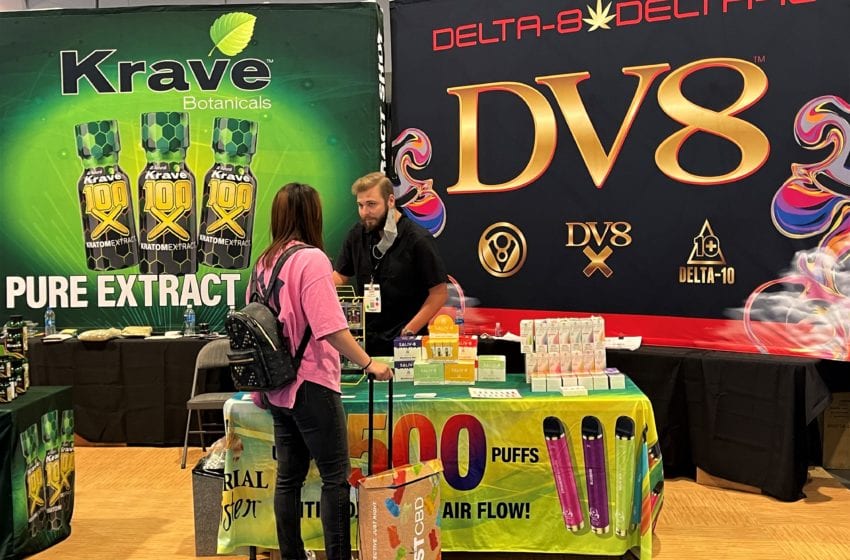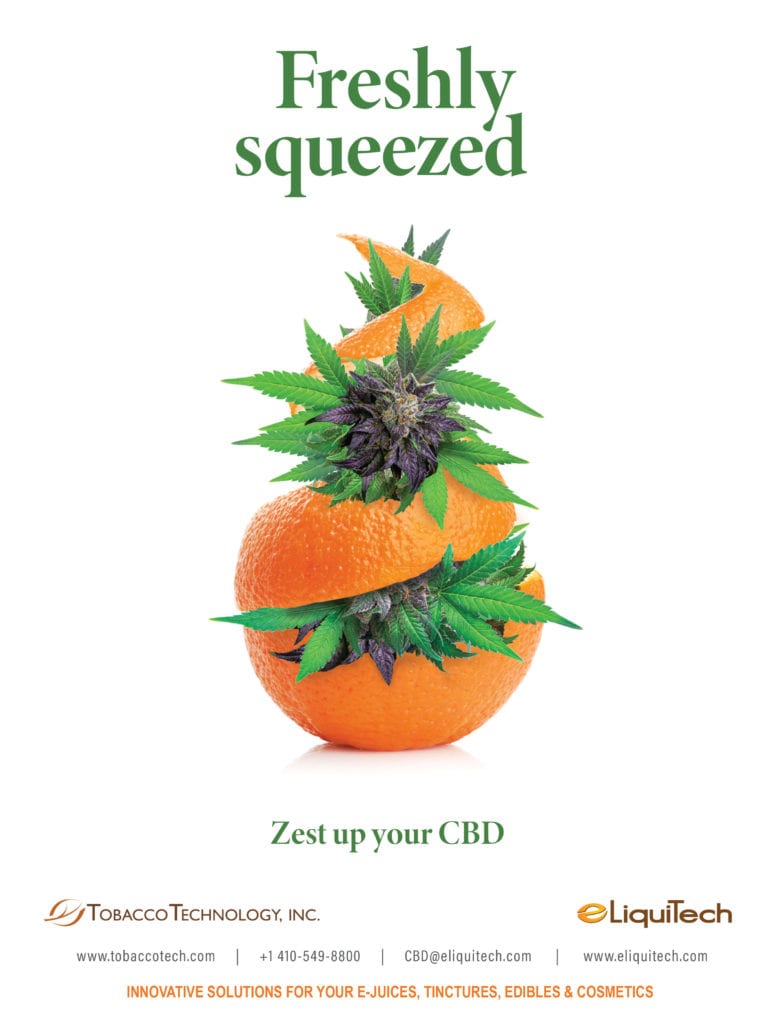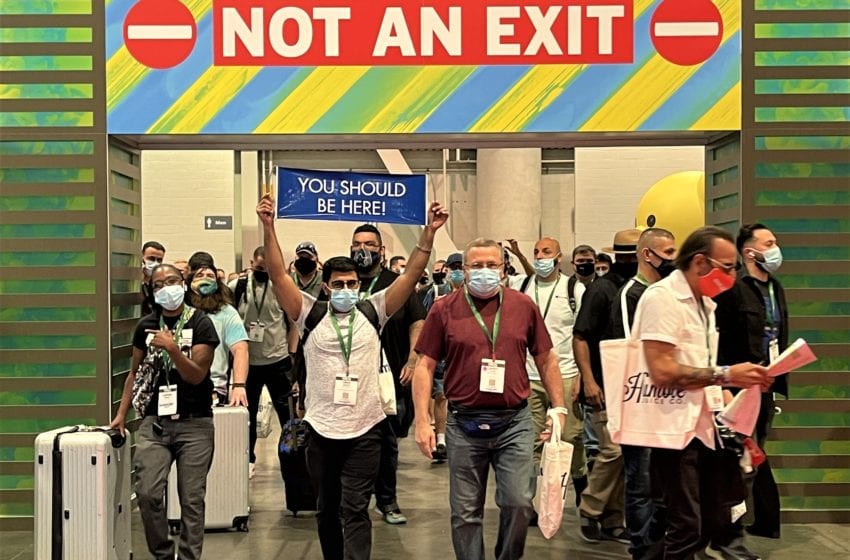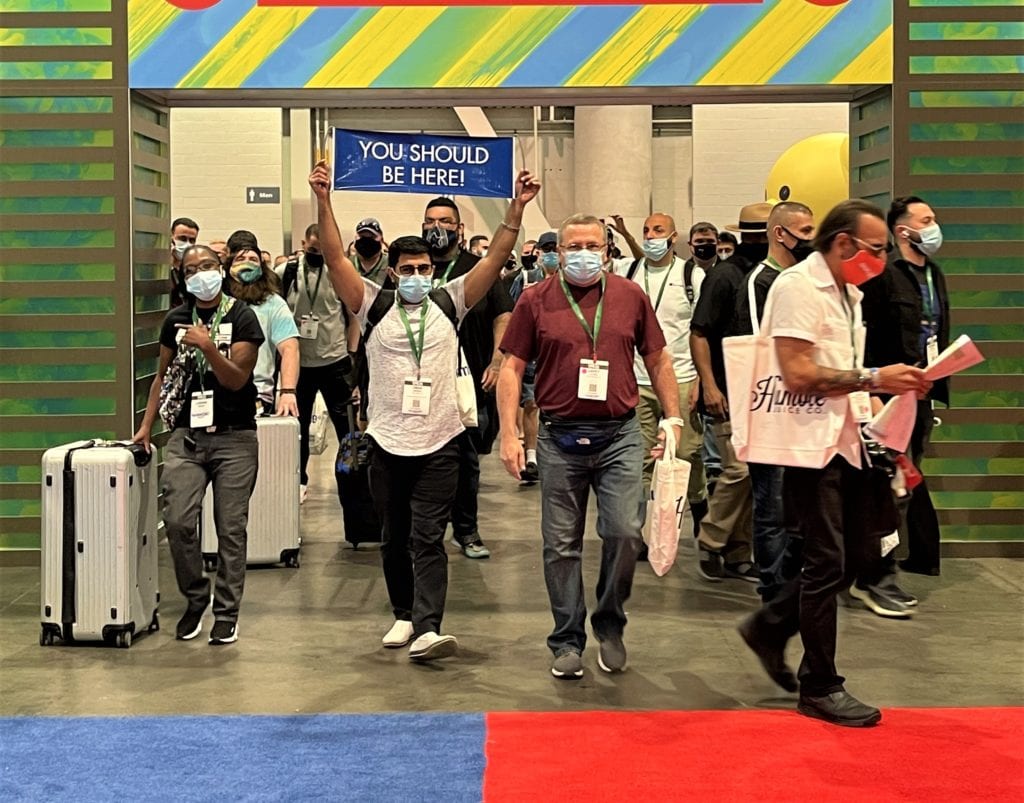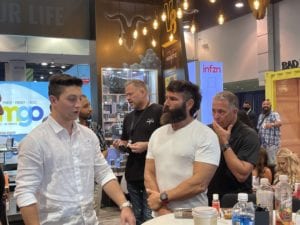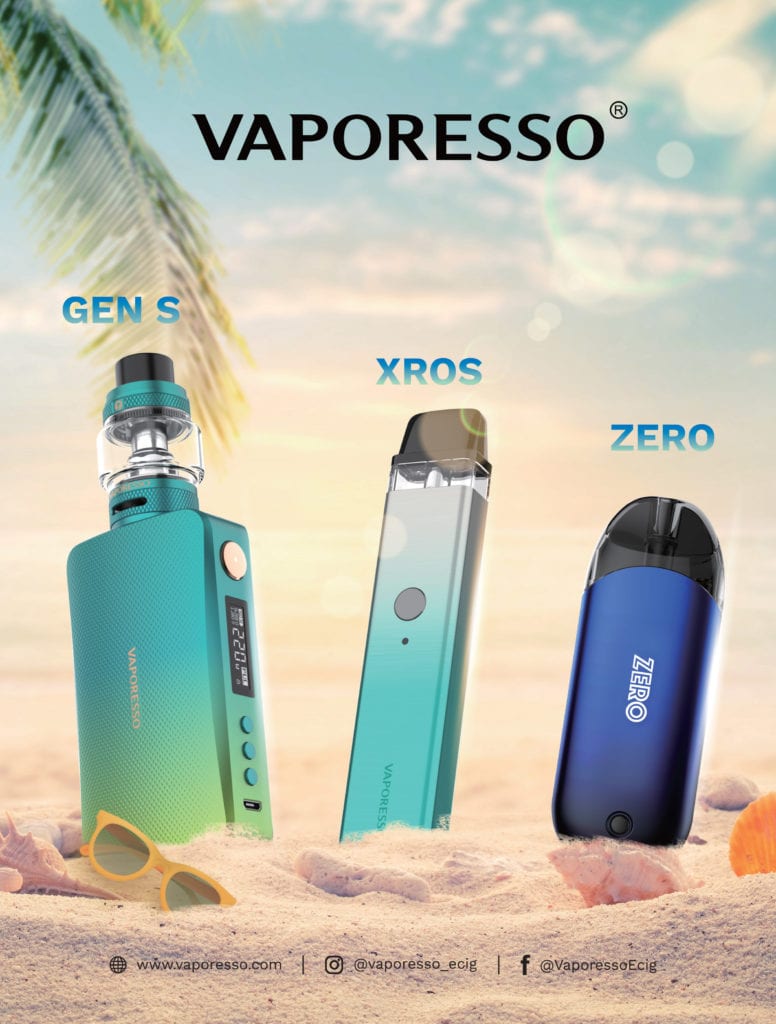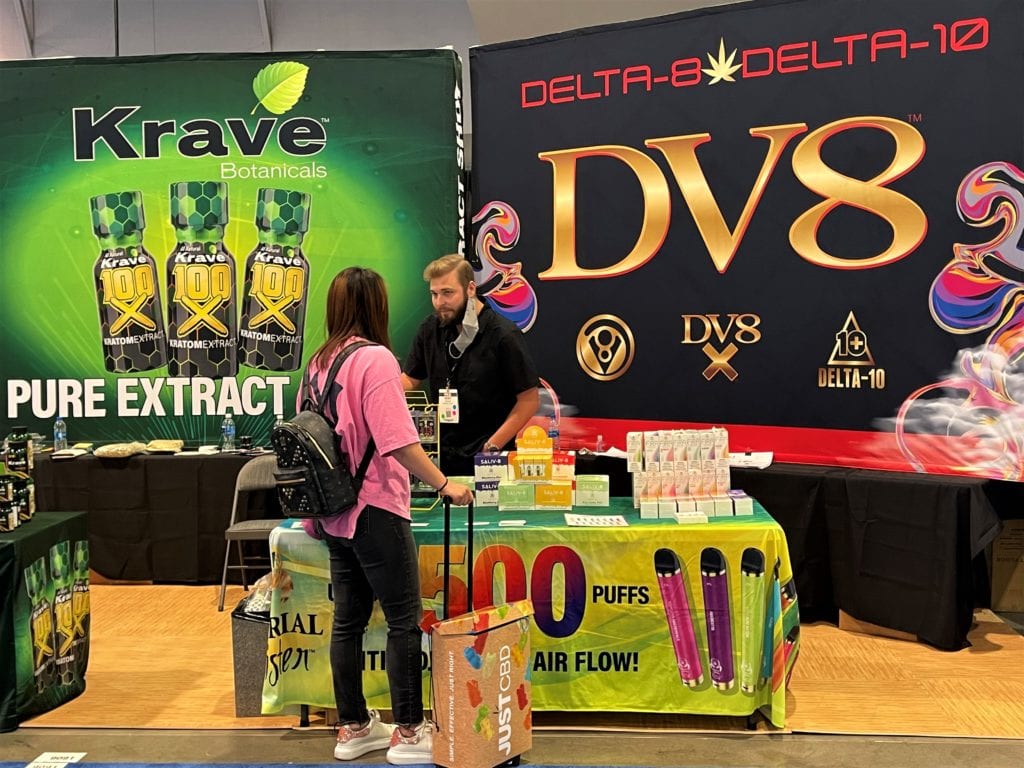
While the legality of Delta-8 THC products is questionable, retailers say consumer demand is booming.
By Timothy S. Donahue
Delta-8 THC is currently one of the hottest cannabis products on the market. During the Tobacco Plus Expo (TPE) in May, an estimated 75–80 exhibitors out of 350 were offering a Delta-8 product. Many companies were introducing new Delta-8 products at the event; for example, Beard Vape Co., Charlie’s Chalk Dust, JustCBD and TD Distribution Co. all launched their own brands.
Recent estimates predict CBD sales in the U.S. could reach $1.8 billion by 2022. Trevor Yahn-Grode of cannabis industry analytics company New Frontier Data recently told MedPageToday.com that Delta-8 THC had retail sales of at least $10 million in 2020. That number is estimated to double in 2021. Based on the number of Delta-8 vendors at TPE (see “Finally Face to Face,” page 20), sales could triple. It was probably the most heavily hawked cannabis product at the event.
The Beard Vape Co. launched its HRVST Delta-8 brand after numerous distributors started asking about the new cannabinoid hitting the mass market, according to Zachary Kestenbaum, vice president of sales. He said his main objective at TPE was to talk with other distribution companies about where the Delta-8 market is headed. Kestenbaum said consumers like the product because it’s not as overwhelming as the traditional Delta-9 THC, the psychoactive component of marijuana commonly referred to as only THC.
“In the ’70s, ’80s, ’90s, people were smoking marijuana with THC levels at 12 [percent] to 15 percent. Now they’re breeding strains that are 24 [percent] to 26 percent THC (Delta-9 THC). It really can give that head anxiety to people,” he said. “That’s why people like Delta-8 THC because you’re getting a little bit of the psychoactive effect but not at that 25 percent level like you get with the Delta-9 THC. People are preferring the Delta-8. They like it better.”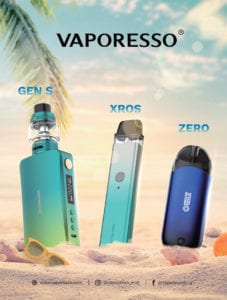
First discovered in 1941, Delta-8 THC is only slightly different from its cousin compound Delta-9 THC. The two chemicals are only one chemical bond apart, according to Josh Church, a scientist and managing director of Roots Holdings. Research has shown that Delta-8 is a powerful anti-seizure drug. “The issue is it just doesn’t naturally occur at significant levels, so it’s really easy to ban,” said Church, adding that Delta-8 also promotes relaxation, clear-headedness and increased positivity.
Research has also shown that Delta-8 significantly helps reduce stress, stimulate an appetite and lessen nausea. Delta-8 is a less “head high” and more of a body high without the nervousness and paranoia often associated with Delta-9 THC. Delta-8 THC, users should be warned, will also turn up on a drug test as “THC,” according to Church.
Looking at legality
While its popularity is spiking across the U.S., Delta-8 is not without controversy. While hemp itself is federally legal (at or less than 0.3 percent THC), each state has different laws and restrictions regarding byproducts derived from hemp, including Delta-8. No products containing Delta-8 have been tested by the U.S. Food and Drug Administration or are FDA-approved.
Twelve states have completely banned Delta-8 sales. Those states include Alaska, Arkansas, Arizona, Colorado, Delaware, Kentucky, Idaho, Iowa, Mississippi, Montana, Rhode Island and Utah. New York has a proposed rule to ban Delta-8 products, which is under a comment period until July 19. California, Oregon, Vermont and Washington are in the process of enacting regulations for Delta-8 products. Several other states are also considering bans.
The federal legality of Delta-8 products is disputed. The misinformation and ambiguity surrounding its legality is why some manufacturers in the CBD industry took time to develop and market their own Delta-8 products. Jakob Gutierrez, product specialist for JustCBD, which launched its JustDELTA-8 brand at TPE, said it took the company time to launch its Delta-8 product because it wanted to be sure it was working within the law. JustCBD only sells its products to retail shops and distributors; it does not sell directly to consumers.
“We wanted to make sure we were covering ourselves and making sure we were doing it right, complying with the right laws. Now, we were missing out a little bit because of that, but we’re back on track,” Gutierrez said. “We got on the train, and orders are exponential for the Delta-8. People are coming in, just ordering various product, and walking out. It’s insane how fast this stuff is flying out.”
Ask eight people if Delta-8 is legal federally and you’ll get eight different answers. Some believe that the vagueness of the 2018 Farm Bill, which legalized hemp and hemp-derived products, means that Delta-8 is currently legal under federal law. “Because Delta-8 is such a new product, many state laws don’t address it at all, which puts it in a gray area of de facto legality,” according to Leafly, a cannabis information source. The reason states have banned Delta-8 products is an uncertainty about what it is and what it does, according to many Delta-8 manufacturers.
On Aug. 21, 2020, the U.S. Drug Enforcement Administration (DEA) issued an Interim Final Ruling (IFR) that stated hemp-derived Delta-8 is federally prohibited and is to be considered the same for enforcement purposes as Delta-9 THC and that “all synthetically derived tetrahydrocannabinols (THC) remain Schedule I controlled substances.” The memo states that these products cannot be shipped to customers from retailers through the U.S. Postal Service or any other shipping method, and it is illegal to use and possess these products in states where cannabis is not legal.
The U.S. Department of Agriculture’s position on Delta-8 THC is that the Farm Bill mandates only a Delta-9 THC limit and doesn’t regulate Delta-8 at all, so Delta-8 is not part of the agency’s hemp mandate, according to previous statements. Since the amount of Delta-8 THC found naturally in hemp is almost 1,000 times lower than the amount of Delta-9, the agency saw no reason to address it at all, including as part of its “total THC” testing requirement.
A hemp trade association and a hemp company have filed a petition in the U.S. Court of Appeals for the District of Columbia challenging the DEA’s IFR. That case is still being reviewed. The D.C. Circuit petition challenges the IFR on the basis that: 1) the DEA did not follow the appropriate notice and comment procedures, 2) the DEA does not have authority under the Farm Bill to issue the IFR, and 3) the DEA’s acting administrator lacks authority to issue the IFR.
Not all states are anti-Delta-8. For example, Florida’s statute states that “any hemp product intended for human or animal ingestion or inhalation which is sold in Florida must comply with all Florida statutes and rules. Any hemp or hemp extract products offered for sale or sold in Florida must comply with all labeling rules and have a certificate of analysis that shows a total THC (THCA x .8777 + THC Delta-9 = total THC) content of 0.3 percent or less.” Florida is the only U.S. state to have enacted legislation to provide a framework for the legal sale of Delta-8.
Florida’s statement on Delta-8 clarifies that Delta-8 does not run afoul of any Florida law and, in fact, certifies that the manufacture and distribution of Delta-8 is allowed in Florida, according to ACS Laboratory, a Tampa, Florida-based CBD testing facility. “Despite Florida’s conservative legislative trends, the state’s public policy toward Delta-8 is progressive and ultimately beneficial,” ACS’ website states. “By establishing a structured and comprehensive regulatory framework for manufacturers and distributors to follow, Florida is enabling a burgeoning industry to continue to grow and evolve while simultaneously ensuring the safety of buyers by mandating certificates of analysis for all [Delta-8] items sold.”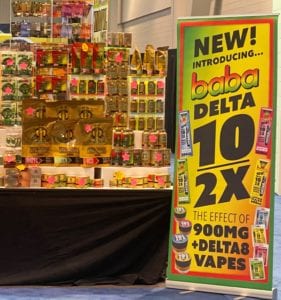
Chemistry lesson
The proposed updates to those New York rules that ban Delta-8 included a provision declaring that all cannabinoid and cannabinol products made through a chemical process called isomerization can no longer be sold in New York. The new rules specified the compounds Delta-8 and Delta-10.
Isomerization is, in its most basic explanation, adding a chemical bond to a molecule, according to Church. “Basically, anything you can make out of the THC molecule is banned because all isomers of said molecule are banned—technically,” explains Church. “If you remember Spice or K2, they were synthetic THC. The issue was the DEA; the FDA would ban the new molecule—say tetrahydrocannabinol (THC) 9753—and then within the next week, they would come up with THC 9756. And it was this cat-and-mouse game where the DEA, the FDA, and the Chinese authorities couldn’t stop them fast enough until they finally just banned all isomers.”
Many industry players say that the federal government will soon legalize marijuana, and the ambiguity around products like Delta-8 and Delta-10 THC will disappear. President Biden has publicly said that he supports the decriminalization of cannabis and removing it from the Schedule I list while Vice President Kamala Harris has gone further, stating that she supports full legalization. But like all the states that have legalized Delta-9 THC and have specifically banned Delta-8, it would not be surprising to see the federal government make some of those same decisions, according to Church.
“Regulation of these cannabinoids … it’s going to take an act of Congress. Then it’s really hard to try and predict what Congress is going to lay forth in the legislation. I mean, look at the nicotine space with synthetic nicotine still not being closed as a loophole around regulation,” explains Church. “Because so many states are banning it right now (Delta-8), I think the federal government will come in with some sort of hefty regulation on all the isomers or conversion molecules.”
Tony Riva, CEO of TD Distribution Co., parent to the Hi Drip e-liquid brand, also launched a Delta-8 brand at TPE. Riva said he didn’t have the concerns many of the other manufacturers had. He says the vapor industry has been dealing with a harsh regulatory environment for nearly a decade. He doesn’t see why the cannabinoid industry is going to be any different, especially as more and more cannabinoids come to market.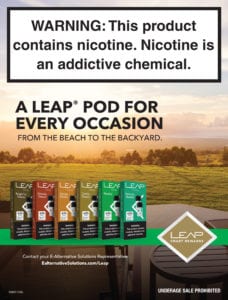
“If I lived in fear all the time in this industry, I’d never get anything done. We are just trying to provide a legal product and hope that the government doesn’t tell us that we can’t. It’s a constant battle with their … tyrannical overreach that they’ve thrown down on the vaping industry,” he says, adding that he expects the cannabis industry to be federally regulated in some form within the next few years. “People like Delta-8; people like Delta-10 or CBD. They feel that it helps them. We are just trying to provide high-quality, legal products to our clients. At the end of the day, it’s just going to be another hula hoop to jump through.”
Church says that he recommends any retailer or manufacturer contemplating entering the Delta-8 market to consider having a firm process of chain-of-custody documentation, adding that the cannabinoid industry should look toward the legal marijuana industry as a guideline. Church emphasized that one bad player could destroy the market by doing something wrong and causing the potential for another situation like the e-cigarette or vaping product use-associated lung injury (EVALI) issues that occurred because a few bad players used vitamin E acetate in black market THC vape pens without doing any research on the chemical.
“Those dirty conversions are out there; there is a lot of risk to a finished good. The last thing you want to see is a dirty lab pumping out a bunch of garbage. Then it gets distributed nationally, and we have another EVALI situation. This isn’t because of the Delta-8, which is largely safe, but because it’s a bad product. I would strongly encourage anyone looking to move into the Delta-8 or Delta-10 space to meet those high standards that are required for any type of legal consumer product,” says Church. “The reality is, though, that the sky’s the limit on these types of products. I think we’re just now seeing it with Delta-8 and Delta-10 … but it’s going to evolve into a crazy world of these new designer cannabinoids. And regulation is coming along for the ride.”

